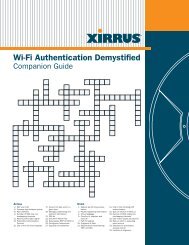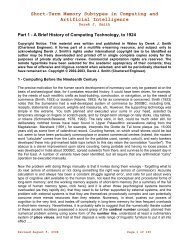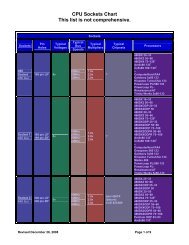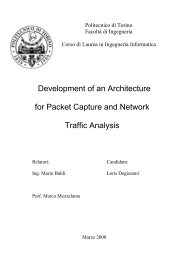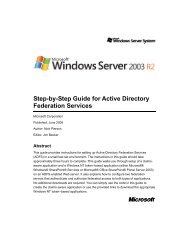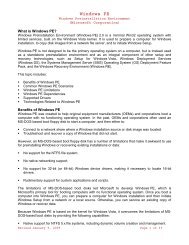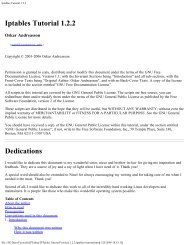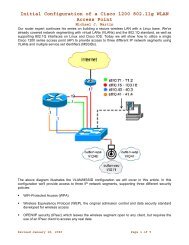SCO UnixWare 2.1 Technical Summary - Bandwidthco Computer ...
SCO UnixWare 2.1 Technical Summary - Bandwidthco Computer ...
SCO UnixWare 2.1 Technical Summary - Bandwidthco Computer ...
You also want an ePaper? Increase the reach of your titles
YUMPU automatically turns print PDFs into web optimized ePapers that Google loves.
<strong>SCO</strong> <strong>UnixWare</strong> <strong>2.1</strong><br />
The three major types of device drivers supported in <strong>SCO</strong> <strong>UnixWare</strong> <strong>2.1</strong> are:<br />
• Host Bus Adapter (HBA) - conforms to PDI framework.<br />
• Network - STREAMS-based Data Link Provider Interface (DLPI) or the Novell Open<br />
Data-Link Interface (ODI) specifications<br />
• video drivers - use UNIX Screen Interface (SI) standards to support multiple Screen<br />
Display Drivers (SDD).<br />
The Portable Device Interface (PDI) is a framework, architecture, and set of kernel interfaces for<br />
developing storage device drivers. It supports a large class of devices including hard disks, tape<br />
drives, CD-ROM drives, and WORM drives. New drivers can easily be developed, installed,<br />
configured and administered using this framework.<br />
Asynchronous I/O<br />
Asynchronous I/O provides a user process with the ability to overlap processing with I/O<br />
operations. This is particularly significant in real time, database and transaction processing<br />
environments where throughput and determinism on a per process/application basis are<br />
important. The asynchronous I/O APIs provided in <strong>SCO</strong> <strong>UnixWare</strong> <strong>2.1</strong> conform to the latest<br />
Draft of the POSIX 1003.1b Real-time Extensions Standard. Asynchronous I/O may be used by<br />
single-threaded or multithreaded applications. Leading database vendors depend on<br />
Asynchronous I/O to gain application performance and scalability.<br />
<strong>SCO</strong> <strong>UnixWare</strong> <strong>2.1</strong> File System Support<br />
The <strong>SCO</strong> <strong>UnixWare</strong> system supports a variety of filesystem types using the Virtual File System<br />
(VFS) architecture. This modular architecture facilitates the integration of new filesystem types<br />
and makes it possible to support the dynamic loading of file system modules into a running<br />
kernel.<br />
The <strong>SCO</strong> <strong>UnixWare</strong> system supports three major categories of file systems: disk-based,<br />
distributed and pseudo. Disk-based file system types supported include:<br />
• VERITAS ® file system (VjFS)*<br />
• UNIX file system (UFS)*<br />
• Secure file system (SFS)*<br />
• System V file system (S5)*<br />
• CD-ROM file system (CDFS)*<br />
• Boot file system (BFS)<br />
• Memory file system (memfs)<br />
• DOS File System (dosfs)<br />
• XENIX filesystem (xxfs)*<br />
*denotes multi-threaded component for increased performance<br />
Distributed file systems provide the user access to files stored on remote systems. The file<br />
system types supported include:<br />
Network File System (NFS) NetWare UNIX Client file system (NUCFS)<br />
17



